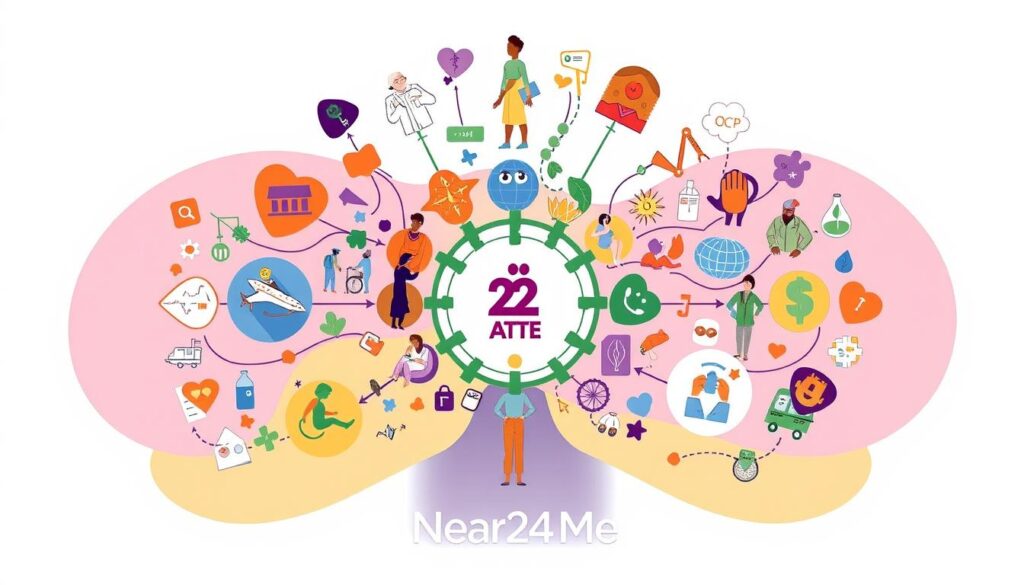Applying for Social Security Disability Insurance (SSDI) can be challenging. Many people get denied because of small mistakes or not knowing the system well. Knowing the common mistakes can help you get approved12.
The SSDI application process can take a long time. It may take months or even years, especially if you need to appeal. Over 75% of first-time applications are denied, and the same goes for reconsideration1. This shows how important it is to have a strong, mistake-free claim from the beginning.
When you apply for SSDI, timing is everything. Applying too late can mean losing benefits, while applying too soon might hurt your case3. Finding the right balance is key and requires careful planning.
Hiring a professional SSDI attorney can greatly help. They know the system well and can guide you. They make sure all paperwork is correct and on time, avoiding mistakes that can cost you2. The upcoming lines will shed deep light on what you need to know before searching for “Social Security Disability Attorneys Near Me”.
Table of Contents
Key Takeaways |”Social Security Disability Attorneys Near Me”
- Most SSDI claims are initially denied
- Timing your application is critical
- Errors in paperwork can lead to denials
- Professional legal help improves approval chances
- The appeal process is often necessary
- Consistent medical documentation is essential
- Understanding SSDI eligibility criteria is crucial
Understanding the Importance of Timing in SSDI Claims
Timing is key when it comes to SSDI applications. It affects your chances of getting approved and the benefits you might get. With over 9 million Americans on disability, knowing how to time your application is crucial4.
The dangers of applying too late
Applying late can cost you a lot. The SSA only goes back one year for retroactive payments. In 2019, nearly 200,000 Indiana workers got disability benefits, showing the need for timely applications4.
Risks of submitting your claim too early
Filing too early can also backfire. The SSA might think your condition is temporary. With a 53% denial rate, timing your claim right is key4.
Finding the right balance for application timing
Finding the perfect timing for your SSDI application is vital. Consider these factors:
- Severity of your condition
- Completeness of medical evidence
- Expected duration of disability
More than 1 in 4 workers will become disabled before retirement4. Getting legal advice can help you meet deadlines and get the most from your benefits.
Understanding SSDI timing is crucial for success. With an average monthly benefit of $1,234 in 2019, a well-timed application is essential for financial security4.
Maintaining Consistent Medical Treatment and Documentation
Regular doctor visits are key to a strong disability claim. Keeping healthcare records up to date is crucial for the Social Security Administration. It’s important to keep a detailed history of your condition for your claim.
The Crucial Role of Regular Doctor Visits
Regular check-ups document your disability. This shows your condition is ongoing. Always go to your appointments and follow your doctor’s advice5.
Strategies for Continuing Treatment Without Insurance
Even without insurance, you can still get medical care. Here are some ways:
- Community health centers
- Sliding scale clinics
- Medicaid applications
- Charity care programs

“Social Security Disability Attorneys Near Me”
Importance of Consistent Medical Records
Keeping up with healthcare records is key for your claim. These records show your condition’s history. They prove your disability meets Social Security’s standards and has lasted a year6.
| Benefits of Consistent Medical Documentation | Impact on SSDI Claim |
|---|---|
| Detailed health history | Stronger evidence of disability |
| Proof of ongoing treatment | Shows commitment to improvement |
| Consistent symptom tracking | Demonstrates severity of condition |
| Regular doctor observations | Professional validation of disability |
Remember, good medical records can help your disability claim a lot. Stay on top of your healthcare and doctor visits. This will help build a strong case for your SSDI application.
Effectively Communicating with Your Healthcare Providers
Talking clearly with your doctor is key for your Social Security Disability claim. Your healthcare team is important in showing your medical proof and checking if you’re disabled. It’s crucial to talk openly with your doctors about your health and how it affects your daily life.
When you talk about your disability, be specific about your symptoms and what you can’t do. Tell your doctor how your condition stops you from doing work tasks and daily things. This helps your doctor write down your medical proof well, which is important for your disability check.
The Social Security Administration (SSA) has strict rules for getting disability benefits. They look at people who can’t work because of a lasting disability or if it could lead to death7. Make sure your doctor knows these rules and can give medical proof that fits the SSA’s idea of disability.
Talk about your limits in detail during your visits. Ask your doctor to write down these limits in your medical records, as they are key for your disability check. It’s also smart to check your medical records often to make sure they show your condition and limits right.
“Effective communication with your healthcare provider is key to building a strong disability claim. Be honest, detailed, and proactive in discussing your condition and its impact on your life.”
Remember, most first-time SSDI claims are denied, with about 70% of initial applications turned down7. This shows how important good and accurate medical proof is for your claim. By keeping clear and consistent talks with your healthcare team, you can greatly boost your chances of a successful disability check and claim approval.
Ensuring Accurate and Complete Paperwork
Filling out SSDI application forms right is key for a good claim. Many face issues because of wrong or missing paperwork. Let’s look at common mistakes and how to fix them to improve your claim.
Common Paperwork Mistakes to Avoid
When you submit SSDI application forms, watch out for these mistakes:
- Incomplete information
- Inconsistent details across forms
- Missing supporting documents
- Vague descriptions of medical conditions
Tips for Filling Out Forms Correctly
To boost your approval chances, follow these tips:
- Give exact names and places of all healthcare providers
- Be there when doctors fill out functional limitation documents
- Include all important medical conditions in your claim8
- Get all needed documents ready before applying8

“Social Security Disability Attorneys Near Me”
Reviewing All Documents Before Submission
It’s vital to check your claim documents well. Make sure all forms are correct and complete. Getting help from a lawyer can also help a lot9.
The Social Security Administration has a five-step process to check if you qualify10. Good paperwork can really help your claim. Take your time to check and confirm all details before you send in your SSDI application forms.
Understanding the Definition of Disability in SSDI Claims
Knowing what the Social Security Administration (SSA) means by disability is key for a winning SSDI claim. The SSA says disability is a medical issue that stops someone from working for over a year or leads to death11.
To get SSDI, you must meet certain rules set by Social Security. You need to show you can’t do any job that most people can do for 8 hours a day, 5 days a week. This rule is strict and based on the SSA’s definition of disability.
The SSA looks at medical and other info to see if you qualify12. This makes sure only those who really need it get SSDI benefits.
“A 20-year-old worker has a 1-in-4 chance of becoming disabled before reaching full retirement age.”
It’s also important to know that doing part-time work or needing many breaks can count as disability. These things can make it hard to work a regular job, which is important for SSDI.
Understanding these details in Social Security rules can help a lot with your SSDI claim. Remember, the SSA’s definition of disability is very specific. It might be different from what you think or other disability programs.
Addressing All Relevant Medical Conditions in Your Claim
When you apply for Social Security Disability Insurance (SSDI), it’s key to show your full health picture. This means listing all your medical issues, both physical and mental. Let’s see why this is so important for your claim’s success.
Listing All Physical and Mental Conditions
Your SSDI claim gets stronger with detailed health documentation. Don’t skip any condition, no matter how small it seems. Each condition adds to your case. The Social Security Administration looks at many health issues that can stop you from working, like anxiety disorders, arthritis, and diabetes13.
Multiple Conditions Strengthen Your Case
Having more than one disability can really help your claim. While one condition might not qualify you, several together could. This shows your full health picture and work limits.

“Social Security Disability Attorneys Near Me”
Providing Comprehensive Medical Evidence
Good medical evidence is crucial for a strong SSDI claim. Include all important medical records, test results, and specialist opinions. This detailed evidence proves how serious your conditions are. With enough evidence, you’re more likely to win your disability case14.
| Type of Evidence | Importance | Impact on Claim |
|---|---|---|
| Medical Records | High | Provides history of conditions |
| Test Results | Critical | Offers objective proof of disabilities |
| Specialist Opinions | Vital | Lends professional credibility to claim |
By covering all your medical conditions and providing detailed evidence, you greatly boost your SSDI claim chances. This way, the Social Security Administration gets a full view of your health. This leads to a fair look at your disability status.
Avoiding Overstatement or Understatement of Your Condition
Telling the truth about your condition is key for a successful SSDI claim. The Social Security Administration checks if your words match your medical records. Getting your disability assessment right is crucial.
It might seem smart to exaggerate your condition to get more help. But, this can actually hurt your case. Understating your condition can also lead to a wrong evaluation.
To keep your medical evidence consistent, be honest about your symptoms. Explain how your condition impacts your daily life and work. This way, your words and medical records will match up.
| Do’s | Don’ts |
|---|---|
| Be specific about limitations | Exaggerate symptoms |
| Provide consistent information | Understate your condition |
| Include all relevant medical evidence | Omit important details |
| Describe impact on daily activities | Provide conflicting information |
The SSA might look at different sources to check your claim. This includes reports from people who know you well. Make sure your descriptions match these reports for a stronger case15.
Being honest and balanced in describing your condition can help your SSDI claim. This shows you’re credible and supports the accuracy of your disability assessment.
Preparing for the Long-Term Nature of the SSDI Process
The Social Security Disability Insurance (SSDI) process is long and complex. Knowing the SSDI process timeline is key for applicants. Let’s look at the main steps to prepare for this long journey.
Understanding typical timelines for SSDI claims
SSDI claims can take months or even years to settle. Initial applications and reconsideration levels often lead to denials. The best chance for approval is at the Administrative Law Judge hearing level, which can take years.
The Social Security Administration (SSA) has strict rules for SSDI applications. They decide if you are disabled16.
Strategies for managing finances during the waiting period
Financial planning is vital during the SSDI process. Here are some tips:
- Create a budget to stretch your savings
- Explore temporary assistance programs
- Seek support from family and friends
- Look into part-time work within SSA guidelines
The importance of persistence and appeals
Persistence is crucial in the SSDI process. Many claims are denied, making appeals essential. Reasons for denial include lack of medical evidence, not following treatment, or not having enough work history16.
Getting professional help can greatly improve your chances. An experienced attorney can guide you, reducing stress and boosting your chances of success17.
| Age Group | Eligibility Requirements |
|---|---|
| Under 50 | Must prove inability to perform any kind of work |
| 50 and above | Somewhat relaxed requirements compared to younger applicants |
Remember, the SSDI process needs patience and preparation. By understanding the timeline, managing your finances, and persisting through appeals, you can increase your chances of a successful claim.
Addressing Substance Abuse Issues in Your SSDI Claim
Substance abuse and disability often go hand in hand, making SSDI eligibility tricky. The Social Security Administration (SSA) looks closely at how drug or alcohol use affects your condition. If substance abuse is seen as a major factor in your disability, it could hurt your claim’s chances18.
To make your case stronger, you need to show that your disability would still exist without substance use. This means providing detailed medical records, lab results, and doctor statements. These should show how severe your condition is and how it limits your work ability18.
The SSA has a strict definition of disability that includes both physical and mental issues. Your application must prove you can’t do substantial work because of your disability, even with no substance abuse18.
- Be honest about your substance use history
- Provide evidence of treatment or recovery efforts
- Focus on how your disability affects your work capacity
Remember, SSDI claims are reviewed carefully. This includes stages like reconsideration and hearings with administrative law judges. It’s key to show a clear, honest view of your condition and its effects on your life18.
If you’re facing substance abuse issues while applying for SSDI, getting legal help is a good idea. An experienced lawyer can guide you through the complex application process. They can also boost your chances of getting approved19.
Social Security Disability Attorneys Near Me: The Importance of Legal Representation
Getting through the Social Security Disability (SSDI) claims process can be hard. That’s why SSDI lawyers are so important. They offer crucial help to improve your chances of winning.
Benefits of Hiring an Experienced SSDI Attorney
SSDI lawyers are full of knowledge. They know the SSDI application process inside out. They can help you avoid mistakes that could harm your claim. Disability claimants with representatives are approved at a rate nearly 3 times higher than those20.

“Social Security Disability Attorneys Near Me”
When to Involve a Legal Professional in Your Claim
It’s smart to get legal help early in the SSDI process. Don’t wait until your claim is denied. An attorney can help you make a strong first application, boosting your approval chances. If your claim is denied, they can help with the appeals.
How Attorneys Can Improve Your Chances of Approval
SSDI lawyers know how to present your case well. They collect and organize your medical records, work history, and other important documents. They also prepare you for hearings and handle talks with the Social Security Administration.
Legal fees for SSDI cases are set. Attorneys usually get 25% of your past-due benefits, up to $7,20021. You only pay if you win, making it easier for many to get help.
“Having an experienced SSDI attorney by your side can make all the difference in securing the benefits you deserve.”
The SSDI process can take a long time. In 2022, the SSA hearing process took over 300 days22. With an attorney’s guidance, you can get through this process better and have a higher chance of success.
Conclusion
Getting through the SSDI claim process can be tough. But with the right planning and focus, you can boost your chances of success. Remember, Social Security Disability can provide a lot of financial help. You could get up to $2,600 a month, or $3,000 for families, based on your work history23.
Timing is key when you apply for disability benefits. It usually takes about five months to get SSDI benefits after you apply24. So, it’s smart to apply as soon as you can. Keep up with your medical care and keep detailed records to help your case. Be truthful about your health, without exaggerating or downplaying it.
The path to Social Security help is long. You need a disability lasting over a year or expected to be fatal24. The Social Security Administration will check your health and work abilities. If you get approved, you might get back pay for up to 12 months. You’ll also qualify for Medicare after 30 months of disability24.
Think about getting help from a professional lawyer for your SSDI claim. A good lawyer knows the rules well, can help with your application, and handle appeals if needed24. With the right support and effort, you can get through the SSDI process and get the benefits you need. The above information are enough when you will type on searching “Social Security Disability Attorneys Near Me”.








vibracion de motor
Dispositivos de balanceo: clave para el funcionamiento uniforme y eficiente de las maquinas.
En el entorno de la avances moderna, donde la productividad y la seguridad del equipo son de suma relevancia, los sistemas de balanceo tienen un funcion crucial. Estos aparatos adaptados estan desarrollados para equilibrar y fijar piezas giratorias, ya sea en dispositivos manufacturera, medios de transporte de desplazamiento o incluso en dispositivos de uso diario.
Para los profesionales en mantenimiento de dispositivos y los ingenieros, operar con sistemas de equilibrado es esencial para promover el operacion fluido y fiable de cualquier mecanismo dinamico. Gracias a estas alternativas tecnologicas sofisticadas, es posible disminuir significativamente las oscilaciones, el sonido y la presion sobre los soportes, extendiendo la longevidad de componentes valiosos.
Asimismo importante es el papel que juegan los equipos de equilibrado en la atencion al cliente. El apoyo profesional y el conservacion continuo utilizando estos dispositivos posibilitan ofrecer servicios de gran estandar, mejorando la satisfaccion de los compradores.
Para los titulares de emprendimientos, la inversion en equipos de balanceo y dispositivos puede ser importante para aumentar la efectividad y rendimiento de sus aparatos. Esto es principalmente trascendental para los inversores que gestionan reducidas y pequenas negocios, donde cada detalle es relevante.
Asimismo, los aparatos de calibracion tienen una vasta aplicacion en el area de la prevencion y el supervision de estandar. Habilitan encontrar probables fallos, previniendo reparaciones elevadas y problemas a los equipos. Ademas, los indicadores generados de estos dispositivos pueden usarse para mejorar procesos y aumentar la presencia en plataformas de investigacion.
Las areas de uso de los equipos de calibracion comprenden diversas industrias, desde la manufactura de vehiculos de dos ruedas hasta el monitoreo de la naturaleza. No influye si se trata de extensas fabricaciones de fabrica o limitados talleres de uso personal, los equipos de ajuste son indispensables para asegurar un operacion productivo y sin presencia de interrupciones.